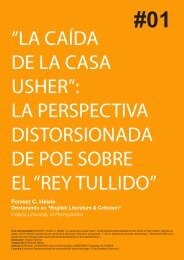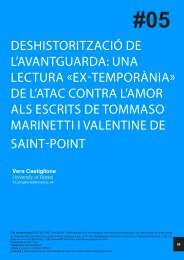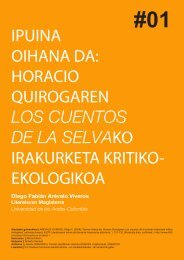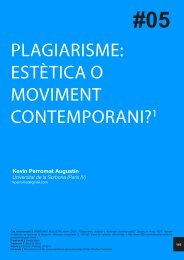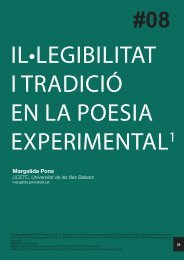a nation of ghosts?: haunting, historical memory and ... - 452ºF
a nation of ghosts?: haunting, historical memory and ... - 452ºF
a nation of ghosts?: haunting, historical memory and ... - 452ºF
You also want an ePaper? Increase the reach of your titles
YUMPU automatically turns print PDFs into web optimized ePapers that Google loves.
… that identity depends on <strong>memory</strong>, whether we mean by that a<br />
core self that remembers its earlier states or, poststructurally, the<br />
narratives that construct (<strong>and</strong> deconstruct) identities by comparing<br />
‘once upon a time’ <strong>and</strong> ‘here <strong>and</strong> now’” (4). Memory st<strong>and</strong>s as the<br />
founding block <strong>of</strong> collective identity, as Andreas Huyssen as noted:<br />
“Without <strong>memory</strong>, without reading the traces <strong>of</strong> the past, there can be<br />
no recognition <strong>of</strong> difference (…), no tolerance for the rich complexities<br />
<strong>and</strong> instabilities <strong>of</strong> personal, cultural, political <strong>and</strong> <strong>nation</strong>al identities”<br />
(252). Memory forms the basis for a sense <strong>of</strong> cultural collective<br />
identity marked by those contingencies <strong>of</strong> difference such as class,<br />
gender, language <strong>and</strong> ethnicity. The construction <strong>of</strong> <strong>nation</strong>al identities<br />
is directly shaped by the recollection <strong>of</strong> collective memories <strong>of</strong> a<br />
common past. As such, <strong>memory</strong> has an important function as a site<br />
<strong>of</strong> struggle <strong>and</strong> resistance for oppressed groups (ethnic <strong>and</strong> linguistic<br />
minorities, political dissidents, women, exiles, migrants, etc.) in their<br />
construction <strong>of</strong> alternative cultural identities, against <strong>of</strong>ficial narratives<br />
<strong>of</strong> the past that has excluded them. These cultural contingencies<br />
can, <strong>and</strong> <strong>of</strong>ten do, cross the geopolitical <strong>nation</strong>al boundaries, <strong>and</strong><br />
therefore trans<strong>nation</strong>al communities are formed. In addition, the new<br />
forces <strong>of</strong> globalization <strong>and</strong> the transformation <strong>of</strong> trans<strong>nation</strong>al public<br />
spheres are also influencing the existing channels <strong>of</strong> remembrance,<br />
<strong>and</strong> the constitution <strong>of</strong> collective identities that do not coincide with<br />
the <strong>nation</strong>-state (Assmann <strong>and</strong> Conrad).<br />
1. Reconstructing memories <strong>and</strong> identities in modern<br />
Spain<br />
En el fondo el olvido es un gran simulacro<br />
nadie sabe ni puede/ aunque quiera/ olvidar<br />
un gran simulacro repleto de fantasmas<br />
Mario Benedetti<br />
El olvido está lleno de memoria<br />
Against this general backdrop, I would like to focus on the<br />
interrelationship between the construction <strong>of</strong> <strong>historical</strong> <strong>memory</strong> <strong>and</strong><br />
the constitution <strong>of</strong> collective identities in modern Spain, at both the<br />
<strong>nation</strong>-state <strong>and</strong> sub-state levels, before an exami<strong>nation</strong> <strong>of</strong> cultural<br />
representations in literature <strong>and</strong> film. The politics <strong>of</strong> <strong>memory</strong> (in its<br />
diverse manifestations as mourning, nostalgia, counter-<strong>memory</strong>, <strong>and</strong><br />
forgetting) has become a site <strong>of</strong> struggle for cultural definition in Spain<br />
in the long period from dictatorship to democracy, <strong>and</strong> the construction<br />
<strong>of</strong> <strong>memory</strong> has played a key role in the subsequent process <strong>of</strong><br />
political <strong>and</strong> cultural decentralization in post-Franco Spain. In this<br />
context, it is crucial to examine how the process <strong>of</strong> identity definition<br />
constructs, <strong>and</strong> is constructed by, <strong>historical</strong> <strong>memory</strong>. This issue is<br />
particularly relevant in our day as Spain’s modern transformation<br />
A Nation <strong>of</strong> Ghosts?: Haunting, Historical Memory <strong>and</strong> Forgetting in Post-Franco Spain - José Colmeiro<br />
<strong>452ºF</strong>. #04 (2011) 17-34.<br />
23




